The Land Bank’s Short Cove trail starts with a short stretch of woods, then passes a wide, stubbly pasture frequented by wild geese, turkeys, and deer. Past another stretch of woods, the trail crosses a pasture down to the shore of Tisbury Great Pond. The cows or sheep along the way offer a glimpse of the farm. In 1939, Arnold Fischer was a recent graduate of UMass Stockbridge when he bought Flat Point. The land was covered with scrubby woods and it took him many years to clear the pastures, but in the process he created a place that has endured, and which his family still farms today.
The Fischer family’s history on the Vineyard stretches back hundreds of years. In the early 1910s, Albert O. Fischer, senior, “drifted here from somewhere,” more or less from New Jersey via Nantucket, according to his granddaughter Eleanor Neubert. He was an adventurer and a jack-of-all-trades, and was staying at the Mansion House in Vineyard Haven when he met a local girl, Ethel Morton Luce. The Luces are an old and prolific Island family; Henry Luce, Ethel’s several-times-great-grandfather, had settled near Scotchman’s Bridge Lane in West Tisbury some time before 1671. According to “The History of Martha’s Vineyard,” by Charles Edward Banks, he also owned land at Great Neck, the same area where Flat Point Farm is today. He had 10 children, mostly boys, and so the Luce name spread around the Vineyard.
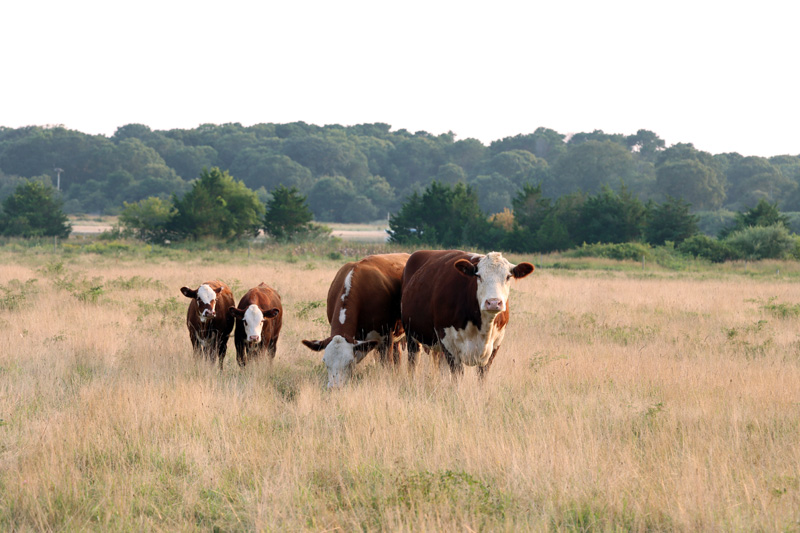
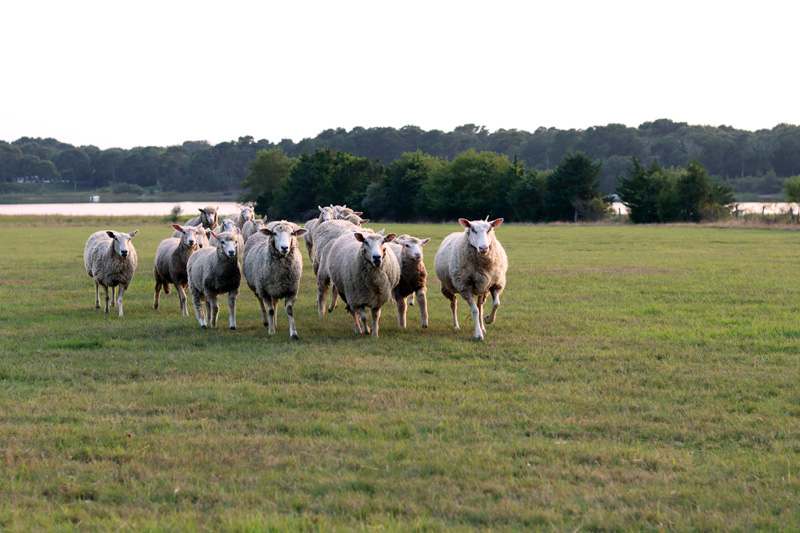
Ethel Luce and Albert Fischer had four children in rapid succession, Fred, Ozzie, Arnold, and Lois, all between 1913 and 1917. All three boys went to study agriculture; Fred studied fruit and vegetables, Ozzie studied poultry, and Arnold majored in dairy. Lois went to nursing school. Ozzie became the caretaker at the Keith Farm in Chilmark, and bought Beetlebung Farm in the 1960s. Arnold started keeping cows in Vineyard Haven, in the area around Skiff Ave. In July of 1945 he was delivering milk and met Priscilla Pettingell, a teacher who was working in a hotel here for the summer, and they married at the beginning of November.
The newlyweds drove the cows up to Flat Point and moved in, with Arnold’s parents in tow. His father, Albert O., helped out with the farming for several years. Eleanor was the first of four children, three girls one after the other, then a boy, Arnie, four years later. “At the time, there were 28 relatively good-sized dairy farms,” Eleanor says of her childhood. She and her sisters would drive around with their father to check on the cows they pastured in Gay Head, tend to the sheep they kept at Sarita and Joe Walker’s, and all over the Island for one errand and another. They spent time in the barn even when they were too little to help, just to get them out of the house, and later they had chores to do.
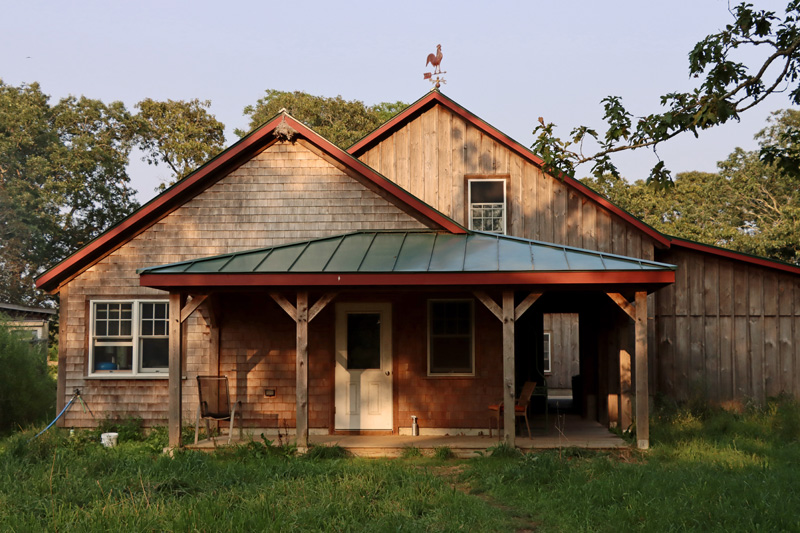
These days, Arnie is the principal farmer. He does most of the tractor work on the farm and takes care of the pigs, cows, sheep, and land — there’s still brush-cutting to do — and there are always repairs. He’s always trying to improve areas of the farm in one way or another. Arnie and his wife Christa were off-Island on vacation when I visited to write this story, and so there is a hole in the middle of it, but his absence reveals the community around his work. Eleanor takes care of the hens and sells their eggs. Christa works with the sheep’s wool, and dyes it with plants from her garden. Their daughter Emily raises goats and makes soap with their milk. Their son Mason lives here in the warmer months of the year and helps with the farm work when he can. Lydia, a second cousin, tends a quarter-acre vegetable garden and sells its produce.
Bringing the children along but not forcing them too much to do chores has kept each generation inspired to take up farming in their turn. Emily lives in a new house on the farm with her husband Doug Brush and their children. Like their mother before them, the boys don’t have set chores, but they’re involved. “Milo and Leon can both milk and throw hay,” Emily says. “The winter chores are easier, so they can help with that.” Of Arnie, she says, “My dad is not a forcer of help. He just lets us help how we want to, because then it makes you want to help, rather than feeling like an obligation.”
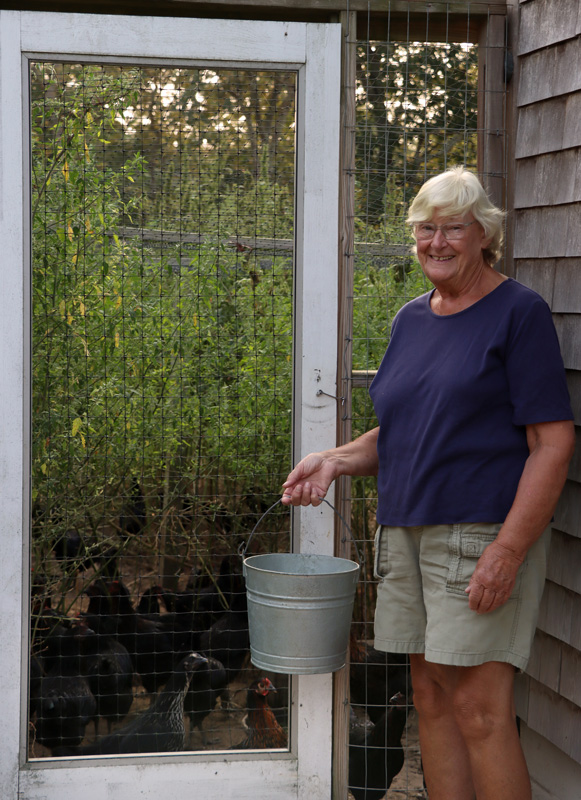
While Arnie is away, Eleanor and members of the younger generations fill in. In the summer, Mason plays a big role in that. Despite their four-decade age difference, Eleanor and Mason have a lot in common and an easy rapport. They divide the chores according to what suits them and their schedules. Because Mason works regular hours as a computer programmer, Eleanor does the morning chores, but he moves the heavy water buckets and feeds and waters the pigs at night. Both Eleanor and Mason’s first memories of life on the farm center around the barn, and both remember sweeping down the middle of the barn as an early chore. “I went out to the barn every night,” Mason says. He boxed up the eggs with neighbor Casey Decker, and the two of them drove around the farm in go-karts.
Haying brings in a multitude of friends and neighbors. Everyone at Flat Point helps, and they all seem to enjoy it. When Eleanor was young, Uncle Ozzie came down from Chilmark with his crew, and later families who had horses came to help in exchange for hay. One of Eleanor’s jobs on the farm is driving the tractor for haying. Her father used to drive the tractor and the girls would sit on his lap when they were little, and at age 8, Eleanor was driving the tractor herself. Mason learned to drive the tractor at about the same age, 41 years after Eleanor did. On hay day now, Mason drives the tractor to the field and Eleanor drives it around once they get there.
Uncle Ozzie’s granddaughter, Lydia Fischer, moved to Flat Point a few years ago. Her father was the caretaker for the Onassis property and had a huge garden, and at age 12, Lydia had her own herb garden. After graduating from Berklee College of Music, she moved to New York City for a while, but returned to the Island after a stint in reality TV casting. She gardened for a season at her grandparent’s property at Beetlebung, but also worked at Morning Glory Farm, where she immersed herself in learning all about tomatoes. A few years ago, her Flat Point cousins invited her to garden there, where Arnie’s quarter-acre vegetable garden was lying fallow, and a bit of housing had opened up there, too. Five years later, Lydia’s “Garden Farm” project grew more than 400 tomato plants this year, in 20 varieties, plus edamame, black beans, corn, and more.
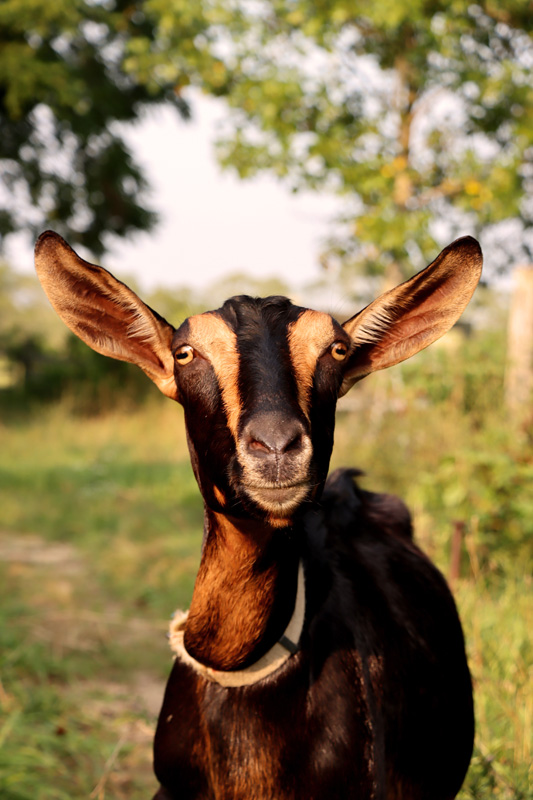
For all the work it requires, hay, sheep, and chickens have never paid all the bills. “We were all told that we were going to attend college,” Eleanor recalls. Her father Arnold “went to bang nails with Daniel and George Manter,” and Arnie had a landscaping business, Moonlight Gardening and Caretaking. Priscilla started teaching first grade as soon as Eleanor started first grade, and went on to be the first principal of the West Tisbury School in its current location. In her turn, Eleanor was a teaching assistant for the younger grades at the Chilmark School for over 30 years, and Christa was a teaching assistant at West Tisbury. Currently, Doug Brush teaches fifth grade math and science, and Lydia works in a fourth grade classroom as an educational support professional, both at the West Tisbury School. “The patience I’ve learned working with children has really helped in dealing with some farmers market customers,” Lydia says. Their teaching salaries might not be large, but they’re steady in a way that the farm’s income never has been.
Teaching and education are the invisible glue that holds the farm together. Doug and Eleanor brought their classes out to see the farm, often when there were new lambs. The farm inspires rather than insists, thanks to the many teachers there. It can also inspire the rest of us as we benefit from the 2013 conservation restriction and public paths, or visit the barn to buy eggs, beef, pork, lamb, and hay. It’s an intergenerational project that reaches out to the wider Island community, even those who aren’t blood relatives.

